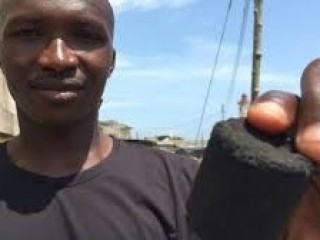Project Results:
The projects follows up on earlier research on liquid waste recycling. In that research a high-quality charcoal briquette product was tested that can be used for large-scale municipal liquid waste treatment. It is an innovative model that brings together proven technologies from urban faecal sludge treatment with new reuse technologies and processes. It includes a women-centered approach to the business of treatment and reuse. The project intended to culminate in a sustainable model for large-scale sanitation and energy provision for cities in Ghana.
Unexpected circumstances
Due to unexpected institutional issues the project could not be carried out as scheduled and was ended after a first initial phase. However, some valuable preliminary research was still done on low cost technologies. A charcoal kiln (no mechanical and electronic components) was developed that can produce high quality end products out of faecal sludge. This knowledge is useful for other similar initiatives.
Partners
Slamson Ghana, ACTWAR
Last project updates
Background
**Sanitation:** Ghana, like many other low- and middle-income countries, has faced financial and technical challenges in establishing and maintaining urban treatment facilities--most human excreta is dumped into the open or into ineffective treatment systems (e.g. overflowing/clogged waste stabilization ponds).
Liquid waste recycling has the potential to relieve the on-going financial burden faced by municipalities to sustain effective treatment services; however, liquid waste recycling technologies that are suited for large-scale municipal use are prohibitively expensive and are not technically feasible given locally available resources (e.g. spare parts, human capacity). Thus, there is an urgent need for low-cost and sustainable municipal-scale systems that are appropriate to the unique circumstances of developing countries.
**Energy:** In Ghana, like many other low- and middle-income countries, the majority of the population uses wood-derived products for their primary energy needs (e.g. firewood and lump charcoal). This practice contributes to high rates of deforestation, especially in urban and peri-urban areas, and environmental contamination (and illnesses) related to the burning of wood in enclosed and poorly-ventilated areas. There is an urgent need to develop alternative low-cost energy products for low-income consumers in all areas of Ghana and the rest of the developing world.
Project Plan
1. Conduct mapping of disposal sites in Sekondi-Takoradi area, and testing of drinking water resources (e.g. boreholes) to determine type and source of contamination.
2. Conduct technology development and product valorization activities (including market assessment) for a modular & low-cost carbonizer to produce biochar and charcoal briquettes in a large-scale municipal production system, and produce a high-quality valorized charcoal briquette product for the reuse business.
3. Formalize training modules and conduct training in the areas of business and entrepreneurial skills (communications, marketing, accounting, assertiveness training, etc), and a work-training program for low- and middle-income women in the Takoradi area.
4. Build and operate an integrated treatment and reuse system that processes 50,000 L of trucked sludge per day into charcoal briquettes.
5. Support the reuse business in distributing & selling approx. 2 tonnes per week of charcoal briquettes on the local market.
Target group
Women from low- and middle-income backgrounds in the Takoradi area will be offered training and work opportunities to manage, operate, and lead the entrepreneurial activities associated with the treatment and reuse system. Further, the following groups will participate in governance, product valorization, and market feedback for Egya-Pa: 1) Sekondi-Takoradi Metropolitan and Shama District Assemblies; 2) Charcoal Sellers' Association; 3) local charcoal consumers/users in Takoradi community.
Sustainability
1. **Financial:** Future operations and maintenance of the system will be sustained through revenues generated by sanitation provision (truck tipping fees) and the reuse business (charcoal and other biochar product sales). The Egya-Pa team will develop a market diversification plan towards increasing incoming faecal sludge to 100,000 per day and use biochar to produce other value-added products (water filters, soil enhancers) for sale in the reuse business to sustain plant operations over time.
2. **Institutional:** ATCWAR and its associated social enterprise, Gateway Projects, will own the facility in a Joint Venture agreement with Slamson Ghana; Gateway Projects will be the contracted operator after the project period for the treatment and reuse business. Partners will work with the Shama district assembly and the Sekondi-Takoradi MA during the project period to establish a clear role for the Shama DA & STMA in the post-project period (e.g. enforcement of dumping practices by sludge trucks, on-going licensing of the facility).
3. **Environmental:** Egya-Pa will provide a safe, odour-free, and effective treatment system for trucked faecal sludge; exiting effluent will conform to EPA Ghana standards for releasing cleansed wastewater into the environment. Faecal solids that remain from treatment will be used as raw material in a charcoal briquette product; no waste streams, thus, will be generated from the facility. Carbonizers used in the biochar production process will be developed in the project period to ensure minimal environmental contamination (eg. gases recirculated in a closed pyrolysis system).
4. **Technical:** Egya-Pa will implement technologies proven in the operational environment (in Accra, Ghana), which are both financially and technically feasible in the local context. The Egya-Pa team will work with local charcoal makers and local mechanics to develop the new charcoal technology to ensure feasibility and sustainability of the technology over time. The new charcoal technology will be developed and built locally with parts that are readily available. Egya-Pa will train local staff, mostly women, in a work-training program alongside Slamson operators for approx. 8 months, working gradually towards operational independence.
5. **Social:** Egya-Pa uses a new model of sanitation and energy production that relies on local influencers (e.g. chiefs and Queen Mothers) and local women from low- and middle-income backgrounds to advise on, manage and operate the system. This closes the gap between sanitation and energy consumers and producers, and offers social agency to a vulnerable group that is typically left out of the power-brokering in these male-dominated industries. Women trained in the first generation for Egya-Pa will have the opportunity to become trainers for similar entrepreneurial and work training for future sanitation and energy projects implemented by Slamson Ghana and ATCWAR.
Overview of Goals
1. **Environmental:** Build and operate a facility that safely treats municipal faecal sludge and produces a high-quality charcoal briquette from the faecal solids > ensure that faecal sludge remains safely contained and treated along the complete sanitation value-chain > ensure water resources remain safe for human use and consumption > reduce rates of water-borne illness in urban areas of Ghana > provide an alternative low-cost energy product that reduces dependency on wood-based resources.
2. **Social:** Provide a model of production that engages sanitation and energy consumers--women--in the processing and production cycle > shift cultural narratives and offer social agency to women in male-dominated sectors > improve social well-being of women, their families, and communities.
3. **Economic:** Develop a sustainable circular economic model for urban sanitation provision by incorporating a viable reuse business > offer training, work and entrepreneurial opportunities to local women and other unskilled workers > improve health outcomes for local communities, thereby improving productivity.
Results and indicators
- Treatment and reuse facility built
- Facility commissioned & operational 1 ( target )
- Document (MoV: Commissioning documents, photos of site)
Quantity of sludge disposed per day (MoV: Disposal logbook)
- Product Valorization
- Product quality >25, and <40 ( target )
- % carbon and ash
- Product emissions TBD ( target )
- Measuring CO (ppm), CO2 (ppm) & PM2.5 (micrograms/m3)
- Market readiness TBD ( target )
- Qualitative & quantitative consumer data related to:
-Overall quality (compared to product currently using)
-Odour & Smoke
-Durability & Storage
-Burning characteristics (ease of lighting, heat generation, duration)
-Price
-Distribution model (likelihood to purchase with proposed distribution approaches)
- Improved quality of local water resources around faecal sludge disposal sites
- Type and source of contaminants TBD ( target )
- Type of contaminants, re: water quality (COD, BOD, pH, conductivity, Ca, nitrates, etc)
Isotope analysis to determine source of contamination.



